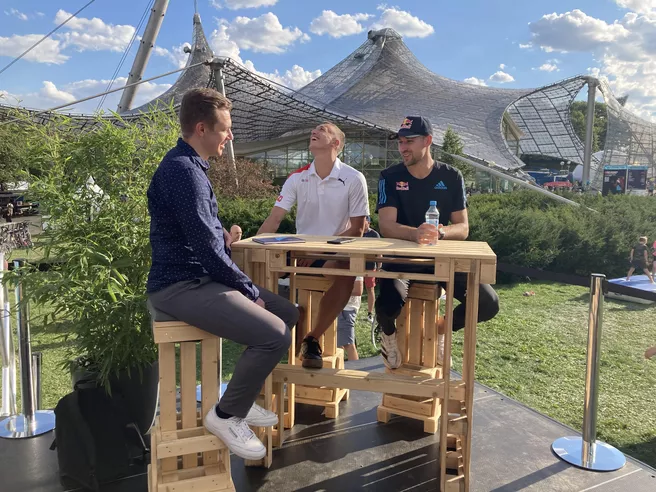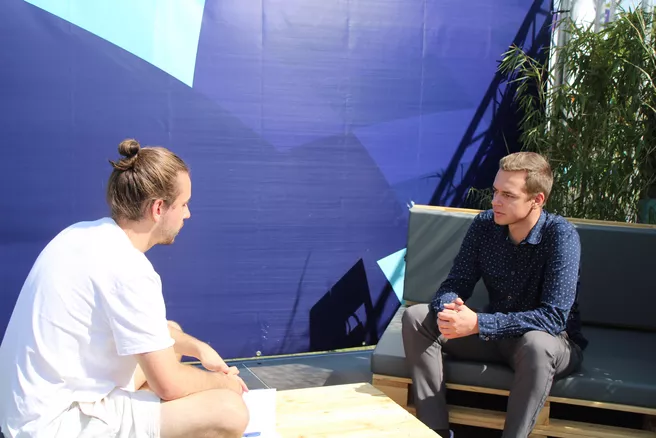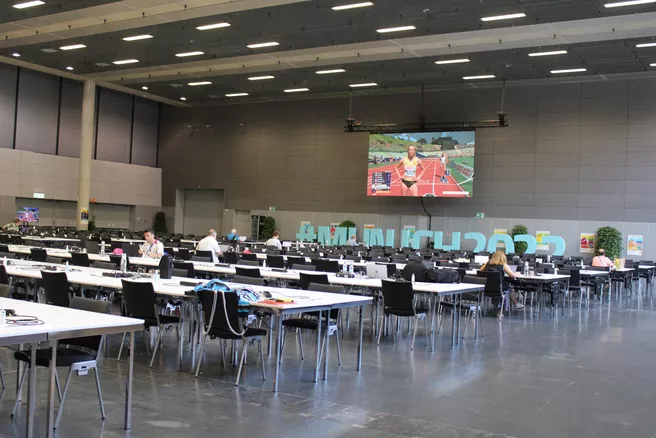Munich's Olympic Park is presenting its most diverse side these days. Athletics in the Olympic Stadium, gymnastics in the Olympic Hall, BMX freestyle on the Olympic Hill. Even the Olympic Lake will be used as a swimming venue for the triathlon competitions. Surrounded by this variety of sports, one building almost gets lost: the small Olympic Hall. Inconspicuously embedded in the natural surroundings of the Olympic Park, it is often perceived only as an annex to its big brother, despite its architecturally sophisticated design. This is also the case at these European Championships.
And this despite the fact that it is precisely here that what a large part of the world will experience from the eleven-day multi-sport event will be created. Since the beginning of the European Championships, the Main Media Center has been located here, the main point of contact for the almost 1,400 accredited media representatives from all over the world. One of them is Nico-Marius Schmitz. He reports from the nine European Championships for the Münchner Merkur and the tz.
He spoke to the TU Munich project group about his job and the daily tasks involved in reporting on such a major event.
Mr. Schmitz, with the European Championships, 50 years after the Olympic Games, Munich once again has a major sporting event here in the Olympic Park. In addition to the athletes, there will of course also be numerous media representatives, including yourself. What are your tasks these days?
Nico-Marius Schmitz: "I am in charge of the European Championships for the Münchner Merkur and the tz. In the first week, I initially tried to drop in everywhere. For example, I was on site at the rowing and climbing events to get an overview of what was going on where and how the various sports were received by the public. As of this week, I'm actually here in the Olympic Park from early morning until late at night, especially in the Olympic Stadium with the athletics."
You've been with the Münchner Merkur/tz media group since 2019, and you were active in journalism before that, too. Did you actually study yourself?
Nico-Marius Schmitz: "My studies are still ongoing. Not journalism, though, but sociology, German studies and European ethnology in Bamberg."
And how did you end up in journalism and at Münchner Merkur?
Nico-Marius Schmitz: "I initially did two internships in the Merkur's online editorial department at Fußball-Vorort (Münchner Merkur's Internet portal for amateur soccer, editor's note) and at kicker. But even before that, I worked as a freelance journalist during my studies. Almost three years ago, I got an inquiry from Munich that they were looking for a volunteer. I knew that it would be a challenge to combine my studies with a traineeship. But I simply didn't want to miss out on this opportunity. If you have the opportunity to get your foot in the door of sports journalism and gain important practical experience, you should take it. After the two years of traineeship, I was taken on as an editor."
You've already mentioned that you coordinate coverage for the Merkur and the tz. What does a day like during the European Championships look like for you?
Nico-Marius Schmitz: "That depends, of course, on what's going on in terms of sports on those days. If important events are already taking place in the morning, then I am already on site for the competitions in the morning. Otherwise, the day usually starts here at the Main Media Center in the small Olympic Hall to get an overview of what is interesting for us and what we focus on. Every day is different, you have to be spontaneous and flexible. Of course we have to see how the competitions are going, where especially the German athletes have chances. But we also want to offer our readers stories beyond the competitions and mere results. For example, I did an interview with Ukrainian high jumper Yaroslava Mahuchich, who told of the war in her homeland. I try to spend as little time as possible at the Main Media Center desk, and as much time as possible in the stadium and with the athletes."
With such a big event with many events taking place in parallel, it's obviously difficult to cover all the competitions and be on site everywhere. How do you divide that up among yourselves?
Nico-Marius Schmitz: "Together with Günter Klein, our chief reporter, I look after the reporting. In addition, we have Mathias Müller in the editorial team, who incidentally is a former student at the Chair of Sports, Media and Communication at the Technical University of Munich, who defines the overall concept. Our trainee is also accredited, so we can use three people. Of course, we try to fill the big decisions ourselves. I would say that of the three to four pages we publish daily about the European Championships, about 80 percent is our own content and we get relatively little from agencies, for example. The focus of our reporting is, of course, on print. But for us, that goes hand in hand with the online department, the texts are also all played out online."
So on the one hand it's about the interaction between print and online, but on the other hand it's also about the interaction between Merkur and tz. How can you imagine that?
Nico-Marius Schmitz: "The texts are basically the same in both newspapers. Of course, the tz, as a tabloid medium, spins differently than the Merkur. There are then other headlines or other pictures. An interview with Alica Schmidt, who has a strong social media presence in addition to sports, naturally has a different focus. In principle, a tabloid newspaper naturally focuses more on pictures and big headlines, whereas at the Merkur you can usually write longer. We write the articles for both newspapers, and they are naturally played out differently for the different target groups and readers."
The Merkur-tz media group is also acting as the official media partner for the European Championships. Does that entail special rights or even obligations?
Nico-Marius Schmitz: "No, there are no obligations, you don't sell your editorial office. So we don't have any requirements that we have to report on anything. Of course, as a media partner, the cooperation is perhaps a bit tighter in some areas, but there are no other advantages or special rights. But I wouldn't want that either, everyone should get the same chance to produce their content here."
The European Championships takes place for the second time this year after 2018. How do you assess the joint staging of various European Championships under one roof from a media perspective?
Nico-Marius Schmitz: "By combining these nine European Championships, you naturally have thousands of opportunities to look for stories. If you don't find a good story here, it's your own fault. Above all, you have a direct line to the athletes. You can't compare that with soccer, for example. There, every interview goes through ten different authorizations and at the end there is no statement left. Here, you can talk to the athletes directly and without detours; it's simply much closer."
But with the inevitably large number of medal decisions and athletes, it also requires intensive preparation. How do you know all the sports well enough to be able to report on them?
Nico-Marius Schmitz: "Of course, you can't be an expert in every sport. You might have three or four sports in which you really know your stuff, but you should have a basic knowledge of all of them. The main thing is to be well prepared for the athlete during interviews, for example. They notice pretty quickly whether you've dealt with them or are still thinking about something quickly before the interview starts. Especially with an interview like with Niklas Kaul after his European Championship title, who had already been on four TV stations beforehand, it's about asking a question that the other journalists might not have asked yet."
Above all, however, it is also about conducting the interview as close to the time as possible so that the statements can still be utilized. After all, it's usually very late in the day for athletics competitions, which is likely to be difficult, especially for print media.
Nico-Marius Schmitz: "In the evening sessions of athletics, you really have to try to finish when the competition is over. Then the sprint towards the mixed zone starts to get one or two more votes. Still, with events so late, it's clear that the texts can't end up in all the editions. That makes it all the more important that they are published online. On an evening like this, every minute really counts for us."
Text/Interview: Simon Sandig
Photos: Michelle Brey & Nico-Marius Schmitz


